|
It was a sunny but cold day in October. Twenty young men in long, dark habits knelt in the big, roomy church. The melody of the old organ, played by an invisible musician, echoed through the building. That melody was unknown to me. On that day, I believed that every corner of that church and my heart were full of the melody of glory. I was one of the twenty men kneeling near the altar who had received from the hands of a priest the big silver cross. It was attached to a ribbon that was a black as coal. This was the act of my eternal sacrifice to God. In my shaking hands, I held the crucifix of the One to whom I promised to be a member of the Society of the Catholic Apostolate. I promised chastity, poverty, obedience, perseverance, the sharing of resources, and the spirit of service. I remember noticing that it was like a wedding: the melody of that song had some similarity to a wedding song, although it is possible that it was just the melody of my heart... After one year in the priesthood, I was completely immersed in pastoral work. Holy Mass, catechesis, and long lines to the confessional before Christmas and Easter filled me with happiness. Often when having conversations with people, I would ask them who Jesus was for them. Once, when I met a classmate from school, she asked what made me decide to become a priest. I tried to explain to her that it was a calling to follow God and to explain the happiness that I had in my heart. However, the more I tried to explain to her, the more I understood the weakness of my arguments to a non-believer. After that conversation, the question that Jesus made to the apostles “Who do you say that I am?” often appeared in my mind. Who is that One to whom I offered my life in the Pallottine community? I was the assistant to the parish priest near my hometown, and I was also a chaplain in a neuropsychiatric clinic where there were more than 200 men with different mental disabilities. I thought that I was used to the unusual situations that sometimes happened during Holy Mass: interruptions, babies with smiles on their faces, spontaneous and childish simple questions that they asked. However, there were still many things I was not used to, like the young burdened man at the clinic who touched the cross that I sometimes wear and asked me, “Who is that man?” I was a little confused by his question and tried to give him a simple answer—I just said that he was my friend. This answer was enough for the young man, because he understood the concept of friendship. His nurse Anna and caretaker Julia, who suffered with him in his illness, embodied friendship for him. Then I noticed that my answer was not just an answer to his question, but also to my own. “Who do you say that I am?” Friendship—this is one word with which I can describe my consecrated life. Friendship is not easy because it implies relationship, maturation, and a constant internal struggle with selfishness. I have noticed that in arduous times in my life the voice of my Friend can be heard more strongly. I have heard that voice many times throughout my Pallottine life. Maybe it was the voice of that invisible musician who played the melody in my heart while I first held the big silver cross in my hands during my final vows. I know that this voice has been calling me to bring the words of His Gospel to many different people and areas, which sometimes are very dangerous and unpredictable. I believe that—like the melody in that church where I was kneeling near the altar with my confreres—my consecrated life gains new notes, changes, and rhythms each day. It is not possible to change the melody. I just try to hear the voice of the Eternal Master, the invisible musician, for whom I have consecrated my life in the melody of His glory. This year, we celebrate World Day for Consecrated Life on February 2. For more resources to guide you through vocational discernment, please click here. To learn more about St. Vincent Pallotti and Pallottine spirituality, please click here.
0 Comments
Two weeks ago, I was walking from my cozy warm apartment in the Northeast part of Washington, D.C. to Union Station to meet up with a friend for dinner. It was 18*F (-7*C) outside and the wind was just starting to pick up. There were forecasts of snow in the next few days. I was bundled up with a wool sweater, socks, jacket, scarf, and gloves. About ten minutes into my walk, I started to regret my decision to walk and wondered if I should’ve called a cab. As I approached Union Station, I could see the Capitol building lit up in the distance. It was there that I saw 8 people lying on the streets completely covered with layers and layers of clothing and blankets. I immediately forgot my own brief and temporary plight. It was a stark and chilling reminder of the great poverty that still exists not only in other countries, but right here in the United States in our capital city. Each January, the Church in the United States recognizes Poverty Awareness Month and takes up Pope Francis' challenge “to live in solidarity with the poor.” Last year, Pope Francis called for the observance of the very first World Day of the Poor. This call was not just for faithful Catholics, but for people of all nationalities, creeds, and socioeconomic backgrounds. As he said in his message for the first World Day of the Poor, “Love has no alibi. Whenever we set out to love as Jesus loved, we have to take the Lord as our example; especially when it comes to loving the poor.” The church and world responded with countless acts of charity and kindness to the poor. Poverty is a massive issue with far too many heartbreaking statistics for us to consider it on only one day each year. It is a concern that needs constant attention and awareness that we can cultivate on a daily basis. Poverty does not simply come in the form of homelessness, but can manifest itself in many different ways. It can be manifested in our neighbor who has to choose between buying prescriptions or groceries, or in the child who cannot focus on school because they have not eaten the proper food they need. It can be manifested in the single mother who cannot afford childcare while she works. Each of us can work towards helping to alleviate poverty. Here at The Catholic University of America, we run a large number of different programs throughout the year that highlight various forms of poverty and ways to help. Twice a year we have massive service days during which we send nearly 900 students to help local organizations that serve the poor. Every week we have twenty opportunities for students to serve the poor across seven different service sites. Some of these include going to soup kitchens or after-school centers and volunteering with the Missionaries of Charity. One of the most highly attended opportunities is a recurring homeless food run in which students take food and supplies to areas of D.C. with large homeless populations. The students do not simply pass out food, but sit and talk with the homeless. They get to know poverty on the most human level possible. They offer their resources, time, and love to those in need. These types of efforts enable us not only to give the poor material goods and the gift of our time, but also help us personally grow. Walking in solidarity with our brothers and sisters and encountering them leaves us transformed. As Pope Francis wrote in Evangelii Gaudium, “This is why I want a Church which is poor and for the poor. They have much to teach us. Not only do they share in the sensus fidei, but in their difficulties they know the suffering Christ. We need to let ourselves be evangelized by them…” Throughout the year, I encourage you to consider participating in or making your own outreach to help those in need—and to bring a friend. Let us allow ourselves to be evangelized by the poor, live in solidarity with them, and work to alleviate their suffering. As St. Vincent Pallotti, the patron of the Catholic Apostolate Center, reminds us, “Remember that the Christian life is one of action; not of speech and daydreams. Let there be few words and many deeds, and let them be done well.” Questions for Reflection: What are some concrete ways you can help alleviate poverty? Has a personal encounter with the poverty of another ever impacted your spiritual life? This past September, a colleague and I traveled to three cities in the U.S. to discuss with local ministry leaders ways in which Catholic Relief Services (CRS) could engage young adults. Our basic question was this: How can CRS contribute to the conversations folks in their 20s and 30s are already having around issues of peace, justice, and global solidarity? Two very clear, and slightly discordant, ideas emerged. The first: folks in their 20s and 30s want to offer their time to serve those in need. The second: we as Church might do better to shift from doing good for a world in need to being good for our world. What do I mean by this? The instinct to do good—to be a service to others, to give of ourselves, to respond in charity to the Gospel invitation to love our neighbor—is something to be applauded. In fact, integrating service into young adult ministry was a priority we heard time and again during our conversations. But not all world-changing, do-good ideas are created equal. In fact, some can be quite harmful. (For one example from some of CRS’ work that illustrates this general point, check out our Changing the Way We Care initiative on orphanages.) I’m not saying we shouldn’t dedicate time, talent, and treasure to helping those in need—both in our own communities and around the world. But we should challenge ourselves to be intentional about our initiatives, to investigate the real impact of our efforts—both intended and unintended. We should also ask ourselves who we are really serving: our own sense of self-worth or the real common good. I write all this by way of reflection on Pope Francis’ calling for a World Day of the Poor, the first of an annually recurring day that begins November 19, 2017. (Click here to read about it in the pope’s own words.) When we think of poverty, our knee-jerk reaction may be to rush to the nearest shelter with old clothes in hand. It may be to donate to a worthy cause. It may be to jump on a plane and fly across the world ready and able to build a house for a family without one. None of those things are bad, right? People need and deserve clothing and shelter, and charitable donations fuel so many organizations like my own. But intentionality demands that we challenge our own assumptions. Is the local shelter looking for the kinds of clothing I’d like to give, and do they have capacity to sort through them? Does that distant country need me to build a house, or is there a local engineer who is better able to accomplish the job? Do I know what percentage of donations an organization puts toward actually helping those in need? These are questions I myself have had to wrestle with, and the answers are different in every situation. But they must be asked. Why? Because they help me remove my own ego from the situation and instead make room for the true needs—and solutions—of others. Pope Francis challenges us to go beyond the doing—which is unmistakably important—to inhabit a new way of living: “We may think of the poor simply as the beneficiaries of our occasional volunteer work, or of impromptu acts of generosity that appease our conscience. However good and useful such acts may be for making us sensitive to people’s needs and the injustices that are often their cause, they ought to lead to a true encounter with the poor and a sharing that becomes a way of life.” So, then, as we reflect on this first World Day of the Poor, I challenge all of us to not simply do good, but to be good—to integrate God’s vision for humanity not simply into our acts of charity but into our daily choices, our lifestyles, and our long-term goals. Question for Reflection: How can you follow Eric's advice and not only do good, but be good? Interested in joining CRS in conversation around these issues? Join our new initiative for folks in their 20s & 30s CROSSROADS en el camino. To learn more about Catholic Social Teaching, please click here.
"On this holy night, while we contemplate the Infant Jesus just born and placed in the manger, we are invited to reflect. How do we welcome the tenderness of God? Do I allow myself to be taken up by God, to be embraced by him, or do I prevent him from drawing close?" - Pope Francis (Christmas Homily, 2014) The past year has seen many moments that called out for the "tenderness of God." Challenging moments of war, suffering, natural disaster, and human-caused neglect - seemingly harsh, rather than tender. Some might use the harshness of the world as an excuse to move away from God or render God irrelevant. Yet, there is still a seeking in the human heart given by God who desires to embrace us and draw us close. When we look at the scene of the Nativity, do we see the tenderness of God in the midst of the harsh reality that Mary and Joseph were not shown tenderness in their need, but instead were rejected? The Son of God came into the world in poverty. At the end of his earthly life, he was rejected once again. The Father, though, continued to show mercy, love, and tenderness by raising him up, opening the way to salvation, and leaving us a share in Christ's mission of love and mercy until he comes again. During this Jubilee of Mercy and beyond, may we go about doing Christ's mission well through living tenderness, reviving faith, rekindling charity - living the corporal and spiritual works of mercy. These works of mercy are practical ways for us to welcome and share the "tenderness of God." On behalf of the board, staff, collaborators, and advisors of the Catholic Apostolate Center, may you have a Blessed Christmas and a good New Year! You will be remembered by me at Masses during the Christmas season! May the charity of Christ urge us on!
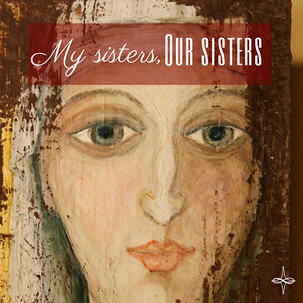 I was going to write this as a reflection on the life of Saint Clare, given her feast day is this week (August 11) and that there are so many interesting facts and stories about her life. Then a different, but related, reflection came to mind… Seven years ago, being a relatively recent convert to Catholicism, I had no idea who the Poor Clares were. However, I gained some new “sisters” when I started a diocesan two-year faith development program that year and was fortunate enough to have two Poor Clare nuns of the Order of St. Clare (OSC) in my class. The Poor Clares take vows of poverty, obedience, chastity, and enclosure and are followers of St. Francis and St. Clare of Assisi, living the simple, Gospel life in an enclosed contemplative community. The variety of Poor Clare expressions includes the Order of St. Clare (OSC), the Colettine Poor Clares (PCC), Capuchin Poor Clares (OSC Cap), and Poor Clares of Perpetual Adoration (PCPA). No matter the expression though, the Poor Clare life of prayer is possible because they do live in community. I am now profoundly involved with the Monastery of St. Clare in Great Falls, Montana and count the nuns of the Poor Clares of Montana, who I affectionately call my sisters, amongst my dearest friends. My sisters have taught me a few things… Sisters Maryalice, Catherine, Jane, and Judith Ann all came to Great Falls 16 years ago at the invitation of the Bishop of the Diocese of Great Falls-Billings, who wanted to bring a monastic presence to the state of Montana. Each sister came from a separate monastery of the Holy Name Federation of Poor Clares along the eastern seaboard. I did not know the sisters then, but I am in awe at their courage, tenacity, and conviction to pull-up their roots and move west to this beautiful, but unknown land, to start the first monastic presence in Montana. They did not know each other well, had never lived in Montana, and had no monastery to occupy. I have moved around a lot in my life, but my horizon was never as uncertain and rocky as was the horizon for these four amazing women. Their story on starting the first monastery in Montana echoes St. Clare, who ran away from her familiar surroundings, wealthy family, and pending marriage in 1212 to join St. Francis in a life dedicated to God. My sisters, you have taught me to trust God’s providence, discern God’s call, and follow that call with all my heart no matter how difficult the road ahead seems. In the time that I have known them, the Poor Clares of Montana have faced numerous, varying tribulations, and in each of those situations, they relied on the power of prayer (ok, no surprise there, that is their vocation – to pray, to pray with and for all of God’s people). Witnessing the sisters’ trials brings to mind St. Clare herself who faced many struggles including years of difficulty in obtaining papal approval of the form of life she and her sisters lived, a life she called “the privilege of highest poverty.” The effect of St. Clare’s prayers also come to mind as her prayers are credited with obtaining victories in turning back invaders of Assisi as well as numerous healings. My sisters, your witness to the power of prayer and reliance on Divine Providence have helped me to deepen my prayer life and ultimately my relationship with Christ. Each Poor Clare community is unique as each monastery is autonomous while expressing the Poor Clare spirit of evangelical poverty, prayer, and contemplation, and the nuns of the Poor Clares of Montana reflect St. Clare’s charisms in their own exceptional way. As a small community (the same four who were the foundresses here 16 years ago are the same four who are the community today), each nun has an enormous workload to keep the monastery running as well as to try to grow her community all while keeping her emphasis on enclosure and prayer. You would think enclosure would ensure a level of certainty, but each day is distinctive for these women. Yet, somehow, the sisters maintain their prayerful focus. What they encounter in the work of each day, likely, is not very different from what St. Clare went through in starting the Order of Poor Ladies of San Damiano over 800 years ago – all the responsibility initially falls on a few until the community can grow. My sisters, you have taught me no matter what each day brings to rely on Christ and persevere through prayer. The Poor Clares of Montana recently started offering contemplative prayer workshops and Christian meditation prayer groups, bringing the Catholic Church’s rich Desert tradition of prayer to the local laity. I am amazed that these women (all who have been involved with prayer for decades longer than I have) continue to expand and deepen their relationship with Christ by embracing various expressions of prayer, adding to their repertoire of vocal and silent prayer methods. I am reminded of St. Clare’s words, “Gaze upon Christ, consider Him, contemplate Him, as you desire to imitate Him.” My sisters, you have shown me the power of praying silently in a group as a way of cultivating my relationship with Holy Trinity, as a way of responding to God’s presence in the world. My sisters live for God alone, dedicating their whole being to God in a life expressed in community, silence, solitude, and prayer. I am grateful for their prayer, their presence, and the peace that they bring me as well as the whole community of God’s people. The Monastery of St. Clare in Great Falls is the only monastery in the state of Montana, but like the dozens of Poor Clare Monasteries in North America and the over 900 in the world, the Poor Clare nuns, following in the footsteps of St. Clare, are here for all of us – my sisters are our sisters. Thanks be to God. Fawn Waranauskas teaches in the Catholic Catechesis Certificate Program for Saint Joseph’s College Online.
This blog post was first published on August 9th on the St. Joseph’s College of Maine Theology Faculty Blog. Click here to learn more about our cooperative alliance with St. Joseph’s College Online. “In the world there is often a lack of joy. We are not called to accomplish epic feats or to proclaim high-sounding words, but to give witness to the joy that arises from the certainty of knowing we are loved, from the confidence that we are saved”
(Rejoice! (Letter in Preparation for the Year of Consecrated Life), n. 3) Last month, on the feast day of St. Ignatius of Loyola, Pope Francis went for lunch at the Generalate of the Jesuits. As I reviewed the pictures from his visit, joy and happiness are very evident. He appears very comfortable and relaxed with them, even though he may not know them well individually. Why is he comfortable? As a member of a religious community, I think that I can venture an answer. He is among those who shared a similar formation as he did as a member of the Society of Jesus. Technically, he formally ended his time as a Jesuit when he became a bishop. Bishops cannot be under the authority of the superior of a religious community. They can, though, ask to continue to use the religious initials of their community as well as wear the habit. Cardinal O’Malley, the Archbishop of Boston, continues to use the initials of the religious community that he came from, the Capuchin Franciscans, as well as wear the habit. Many religious communities even officially continue to count bishops among their membership. Some might think this strange, but the reality is that once a person is part of a religious community, it is part of who that person is and how the person approaches God, life, ministry. When you share a common formation and lifestyle from a relatively young age, that formation does not simply go away. It is a lifestyle that one freely chooses and it forms and informs the person. Once committed to, consecrated life (cf. Catechism of the Catholic Church, n. 913-933) is not something that can easily be cast aside. Even those who have left religious communities often continue to live the spirituality of that community as a single or married person or diocesan priest. I have seen it time and time again. Twenty-eight years ago today, I made my First Consecration of Promises as a member of the Society of the Catholic Apostolate (Pallottine Fathers and Brothers). Our six promises of poverty, chastity, obedience, sharing of resources, spirit of service, and perseverance have provided me with a way, within the context of our community life, to live the charity of Christ. I make no claim to live it perfectly, but I try to live it as authentically as possible. The way that I live more authentically is through the assistance of the members of my community who “urge me on” to live more fully in Christ’s love. This summer, more than most, I have had to even more deeply reflect on the quality of my life as a member of the Society. Am I living as an apostle, as St. Vincent Pallotti called all to do, reviving faith and rekindling charity? Have I fully surrendered, given, and offered myself to God, as the form of consecration of my religious community challenges me to do? If not, then why not? These questions have been very much on my mind as I form, with the help of God, a new member of the Society who began Postulancy only a few days ago. Thirty years ago last month, I did the same and have grown and developed spiritually and otherwise in ways that I would have never thought or imagined. As I work in formation with our Postulant, Brandon, I try to teach, but once again God causes me to learn and for that I am full of gratitude and joy. Pray for those in consecrated life, especially as the Church prepares for the Year of Consecrated Life that will begin this coming Advent! Fr. Frank Donio, S.A.C., is Director of the Catholic Apostolate Center and teaches for Saint Joseph’s College Online. This blog post was first published on August 17th on the St. Joseph’s College of Maine Theology Faculty Blog. Click here to learn more about our cooperative alliance with St. Joseph’s College Online I spent my spring break in Diriamba, Nicaragua, living with abandoned special-needs children. The experience taught me more than I could ever say or write, but one person’s words and actions are still fresh in my mind.
Our guide Julia (pronounced who-lee-uh) was a no-nonsense woman who spoke heavily accented English. Understanding her was a twofold challenge. First was fighting through her accent, but second was following her train of thought. Julia was full of grand ideas; language was often an inadequate vehicle for the love she shared with everyone she encountered. Her sentences could ramble and her ideas could blur together, yet the message always rang true. Julia was the quintessential guide. She got us where we needed to go, naturally, but was always there to fill in the necessary information we lacked. She helped us understand Nicaragua in ways we could not have otherwise. Julia taught us something about wealth. When we saw families living in shacks unfit for an American dog, she taught us to see what they had, not what they lacked. Poverty forced families together, she said. Multiple generations lived together in the same home, spending their lives on the same minuscule pocket of land. We have technology, but how often did we see our families? How much did we truly love our closest relatives? Our hearts ached for the poor, but she reminded us of the powerful love coming from their poverty. Julia taught us about discipline. She worked alongside an amazing staff at Mustard Seed Communities, the organization that ran the orphanage where we stayed. Blessed with limitless patience, these women worked tirelessly caring for children who had no one else to care for them. For this to be possible, some level of order had to be maintained. The last day we were there, multiple kids were kept inside, unable to play with us or the other children. When it came time to say good-bye, Julia had to hold firm and keep the kids inside. Love is not always nice, and allowing the children free reign was no favor to them. Julia taught us about pride. Anywhere we went, she glowed as we took in the beauty of her country. Surrounding the poverty and hardship were spectacular views in the mountains, sandy beaches and a volcanic lake that was nothing short of paradise. The homes were bright and clean. No one had much, but what they had was theirs, and that meant something to them. Anytime we ate, she spoke of the national cuisine. They don’t cook with spice, they add it at the end, she said. She spoke of their national cheese, a salty, creamy white cheese served with plantains. She spoke of their national drink, the Macuá, which was a mixture of white rum, orange, guava and lemon juices. Her pride never boasted, only sought to show the beauty and the good in her country Julia taught us about love. Love is simple, yet strong. It is not always nice, but enables true care. It does not boast, but carries itself confidently. Love extends to every facet of life and extends to everyone encountered. Julia taught us all of this less with words and more with actions. She was ordinarily heroic, doing great things in simple ways. Time will erode many of the memories formed in Nicaragua, yet Julia will stand the test of time. I went to Nicaragua to help those in need, but I left finding I was in as much need as the people of Nicaragua, and most of those lessons came from Julia. Zack Lemon is a student at Ashland University in Ashland, Ohio and a student leader for the Campus Ministry Leadership Institute, sponsored in part by the Catholic Apostolate Center. This post originally appeared in The Collegian, the student newspaper of Ashland University.  It certainly surprised me to find out that one of Christianity's most popular saints never actually said this, nor did he write the "Make me an instrument of Your peace" prayer! While these often-used quotes are very much in the spirit of St. Francis, the sentiment was likely inspired by a line from the Franciscan Rule, in which he said, "Let all the brothers, however, preach by their deeds." We all know St. Francis as the saint of simplicity, of appreciation for God's creation, and, of course, preaching to the birds. He was known in his lifetime as a man of great poverty, giving up all that he owned for the poor. In fact, as a young man, he stripped off his clothes in the middle of Assisi and renounced all worldly possessions, including his inheritance from his father. From that point on, Francis spent his life in service to the Gospel and God's people, spreading the message of Christ by the way he lived his life and interacted with others. It comes as no surprise, then, that our current Pope, a Jesuit, made a nod to this charism of simplicity and authenticity in choosing the name of Francis. It is, I believe, a stark reminder to the Church universal of exactly what the New Evangelization is all about: encountering Christ in our everyday lives and bringing Him to the world in the simplest ways possible. There is no better delivery of the Gospel than to treat every person we meet with simple Christian charity, as though he or she were Christ Himself. We are, after all, made in His very image and likeness! Two years ago while on pilgrimage to Rome, I had the great blessing of taking a day trip to Assisi. Many of us have heard the story of the San Damiano Cross, through which Francis heard the Lord say, "Rebuild my church, which as you see has fallen into ruin." Spending a day of prayer before that same cross, walking the hilly streets Francis traversed so many times in his life, and praying in the Porziuncola (the chapel Francis built with his own two hands), was like a step right into the life of the Saint. It inspired me in a very profound way to always remember that the goal of our faith is quite simple. If we live our lives with true authenticity to the Gospel, we rarely have need for words. Looking, then, to the example of Pope Francis and his namesake, today's Feast reminds us to live our faith simply, to find God in the simplicity of nature, the beauty of His creation, and in the face of each person we meet. It is how Christ lived his life, and how we are called to live ours. With that reminder, may we all be the instrument of His peace that our world so desperately needs us to be. Jay Schaefer is the Webinar Associate for the Catholic Apostolate Center.
In 1979, Blessed Teresa of Calcutta, then Mother Teresa, was awarded the Nobel Peace Prize given to “the person who shall have done the most or the best work for fraternity between nations, for the abolition of reduction of standing armies and for the holding and promotion of peace congresses.” Below is a portion of her Nobel Lecture in which she speaks of the joy in her work of enkindling charity and the call we have to pass on this joy to others.  And so here I am talking with you - I want you to find the poor here, right in your own home first. And begin love there. Be that good news to your own people. And find out about your next-door-neighbor - do you know who they are? I had the most extraordinary experience with a Hindu family who had eight children. A gentleman came to our house and said: Mother Teresa, there is a family with eight children, they had not eaten for so long- do something. So I took some rice and I went there immediately. And I saw the children- their eyes shining with hunger - I don't know if you have ever seen hunger. But I have seen it very often. And she took the rice, she divided the rice, and she went out. When she came back I asked her - where did you go, what did you do? And she gave me a very simple answer: They are hungry also. What struck me most was that she knew- and who are they, a Muslim family - and she knew. I didn't bring more rice that evening because I wanted them to enjoy the joy of sharing. But there were those children, radiating joy, sharing the joy with their mother because she had the love to give. And you see this is where love begins- at home… …And I know well that you have not given from your abundance, but you have given until it has hurt you. Today the little children they have- I was so surprised - there is so much joy for the children that are hungry. That the children like themselves will need love and care and tenderness, like they get so much from their parents. So let us thank God that we have had this opportunity to come to know each other, and this knowledge of each other has brought us very close. And we will be able to help not only the children of India and Africa, but will be able to help the children of the whole world, because as you know our Sisters are all over the world. And with this prize that I have received as a prize of peace, I am going to try to make the home for many people that have no home. Because I believe that love begins at home, and if we can create a home for the poor- I think that more and more love will spread. And we will be able through this understanding love to bring peace, be good news to the poor. The poor in our own family first, in our country and in the world. 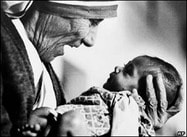 To be able to do this, our Sisters, our lives have to be woven with prayer. They have to be woven with Christ to be able to understand, to be able to share. Because today there is so much suffering - and I feel that the passion of Christ is being relived all over again - are we there to share that passion, to share that suffering of people. Around the world, not only in the poor countries, but I found the poverty of the West so much more difficult to remove. When I pick up a person from the street, hungry, I give him a plate of rice, a piece of bread, I have satisfied. I have removed that hunger. But a person that is shut out, that feels unwanted, unloved, terrified, the person that has been thrown out from society - that poverty is so hurtable and so much, and I find that very difficult. Our Sisters are working amongst that kind of people in the West. So you must pray for us that we may be able to be that good news, but we cannot do that without you, you have to do that here in your country. You must come to know the poor, maybe our people here have material things, everything, but I think that if we all look into our own homes, how difficult we find it sometimes to smile at each other, and that the smile is the beginning of love. And so let us always meet each other with a smile, for the smile is the beginning of love, and once we begin to love each other naturally we want to do something. So you pray for our Sisters and for me and for our Brothers, and for our Co-Workers that are around the world. That we may remain faithful to the gift of God, to love Him and serve Him in the poor together with you. What we have done we should not have been able to do if you did not share with your prayers, with your gifts, this continual giving. But I don't want you to give me from your abundance, I want that you give me until it hurts. The other day I received 15 dollars from a man who has been on his back for twenty years, and the only part that he can move is his right hand. And the only companion that he enjoys is smoking. And he said to me: I do not smoke for one week, and I send you this money. It must have been a terrible sacrifice for him, but see how beautiful, how he shared, and with that money I bought bread and I gave to those who are hungry with a joy on both sides, he was giving and the poor were receiving. This is something that you and I- it is a gift of God to us to be able to share our love with others. And let it be as it was for Jesus. Let us love one another as he loved us. Let us love Him with undivided love. And the joy of loving Him and each other- let us give now - that Christmas is coming so close. Let us keep that joy of loving Jesus in our hearts. And share that joy with all that we come in touch with. And that radiating joy is real, for we have no reason not to be happy because we have no Christ with us. Christ in our hearts, Christ in the poor that we meet, Christ in the smile that we give and the smile that we receive. Let us make that one point: That no child will be unwanted, and also that we meet each other always with a smile, especially when it is difficult to smile. "With all vigilance guard your heart, for in it are the sources of life."
-Proverbs 4:23 When I was first hired to teach at my high school and was told I was going to be teaching social justice, I was very excited. I had learned a lot from different teachers over the years about social justice issues plaguing our society and I wanted to ignite a fire in my students that they could make a difference and impact society. I knew it was going to be a challenging topic to teach, especially to high school students, but I never realized the toll it would have on me. Halfway through my first year of teaching, one of my students handed me a post it note with Proverbs 4:23 written on it. The interpretation she had written was “Above all else, guard your heart. For everything you do flows from it.” It took me some time to realize what she was trying to tell me through this passage, but once I realized what she meant it changed my thinking and my outlook on what I was teaching and the world around me. Some of the topics we cover are racism, prejudice, and poverty. I very quickly realized that in order to make the girls aware of the problems in the world around them, I had to bring in real world examples. At the beginning of every class, my students were invited to bring in news articles or experiences of their own that related back to the topic. I would also research different events or issues myself. After reading and hearing somewhere around 100 different examples of where our society has gone wrong and how we are hurting each other, I began to get a sense of hopelessness. My heart began to hurt because we have so many solutions on how to make our society better, and still nothing ever gets done. It reached a point that I didn’t think society would ever change and I started to stop believing in what I was teaching. Every morning we wake up and turn on the news and see news report after news report of our society tearing each other apart and forgetting the value that each one of us has. That kind of destruction and hurt takes a toll on you; especially your heart, and can make you feel helpless. My student recognized what was happening to my heart and saw me breaking after every news report and life experience I heard in class. She left me this note to remind me that despite the world we are living in, we have to guard our hearts because that is where your drive and spirit comes from. She showed me that if I protect my heart and keep faith and hope in God and the world he created, things could get better. It is really easy to lose faith and hope and have your heart get hurt if you don’t guard it. Once you lose hope and your heartbreaks, everything in your life is affected. Your heart is the center of everything and it drives your life and your passion. If you don’t guard it and keep it safe, you can’t be the best version of yourself. Erin Flynn serves as a high school religion teacher in the Diocese of Brooklyn, New York. The parable of Lazarus and the Rich Man in Luke’s Gospel is a passage referenced often for its moral lessons: how to treat the poor, how to avoid the dominance wealth can have on an individual. Readers take one look at the characters and find the lessons that can be applied in their own lives. However, a recent reading of John Chrysostom’s sermons On Wealth and Poverty has encouraged me to take a longer look at this parable. Chrysostom argues that we can learn from the parable not only about the characters in it, but also about the God who saves them.
We find Lazarus in a state of great poverty. Jesus tells us in Luke’s Gospel that Lazarus “would gladly have eaten his fill of the scraps that fell from the rich man’s table. Dogs even used to come lick his sores (Lk 16-21).” The details in this account show us that Lazarus was not just any poor person, he was the poorest. He could not afford anything for himself. He was so weak that he could not even fight small animals away. What does this say about the rich man? What kind of person must he be to pass by Lazarus without being moved to pity him? He must have passed him multiple times since Lazarus was right outside the rich man’s home. This paints a picture of a man who is not only consumed by his wealth, but is also blinded by it. Given these two characters and the details told of them, what can be determined about God? Earlier in the Gospel of Luke, Christ gives the famous Beatitudes, speaking about those who are “Blessed,” which can also mean “happy.” He says that in God’s eyes, those who are poor, hungry and weeping are the ones who are blessed and will be eternally happy.(Lk 6: 20-22) Lazarus embodies these characteristics to the extreme. And through Lazarus we see a reversal in heaven of what is on the earth. That is to say, that through Christ, those who are poor are wealthy in God. In contrast, the rich man in the story, consumed by his desire for earthly wealth and status, finds himself in the netherworld after death.(Lk 16:23)He is the epitome of those Christ warned against in the second half of the Beatitudes. His “woe to you” lines speak out to all of the characteristics that the rich man had: money, fame and laughter. But this is not limited to a criticism of success or money, but rather reflects on how the rich man used his wealth. He did not share even the least of his possessions with Lazarus. Because of the character of God, He ends up sharing nothing of Heaven with the rich man. It echoes Jesus’ words, “What you did to the least of my brothers, you did to me.”(Mt 25:40) We see Lazarus in Heaven sitting with Abraham. The hopefulness to spend eternal life with Abraham, the father of the Israelites, is what makes the poor rich. This hope given to us directly from God is reflected within Lazarus himself. God took the poorest of the poor, and elevated him to standing side-by-side with Abraham. This alludes to the mercy that God has on us, culminating with the death of Christ Himself. In this death, we see a complete reversal: the son of God accepts the poverty, humiliation, and human death that we all must experience at some point. But Christ also shows us what awaits us in Heaven: endless mercy and love. Lazarus’s poverty, hunger, and rejection from society become his greatest strength. For what kind of person does it take to endure such ridicule? Our God is a God who notices such characteristics that go beyond that scope of the world. In this parable, we see more than just a poor cripple and a pitiless man. We see a God who is completely merciful, reversing the earthly situation Lazarus found himself in. The parable represents an eschatological reversal stated clearly in the Beatitudes: The poor are blessed and the rich are warned. Most importantly, we have a God whose mercy extends to both sides if they choose to accept it. Thomas Coast works in the Diocese of Manchester NH and working on is MA in Theology through the Echo Faith Formation Program out of the University of Notre Dame. “God is preparing a new dwelling place and a new earth where justice will abide”
–Gaudium et Spes, 39 Pablo Picasso "Dove of Peace" As I was growing up in a small seaside town north of Boston, I never once said, “I want to be a social worker someday.” Yet, here I am, one month shy of a Master of Social Work degree from Boston College. Like many other professional degree curricula, all accredited social work degree programs require significant fieldwork. My field education gave me the opportunity to work as a Legislative Advocacy intern with the Massachusetts Coalition for the Homeless. My projects have included significant outreach to drop-in centers and shelters for young adults experiencing homelessness in the Commonwealth of Massachusetts. As a young Catholic woman educated in human service design, delivery, and evaluation, I typically approach social problems with an eye of strategy, compassion, and determination. For the first time in my early career I have, however, added a layer of personal connection and relevance to my work. Not only are the groups that I am working with brothers and sisters of the greater universal family, but also they are my peers. Most of the young adults I have worked with this year balance schedules similar to my own, including school, relationships, work, high transportation costs, and family frustrations. The biggest difference between me and my peers that I met during this project is that these are young adults unaccompanied by a guardian or parent and experiencing homelessness. My responsibilities while performing outreach work and legislative advocacy has included visiting drop-in centers and shelters for young adults to encourage them to share their story in order to call for more action to support them. The young adults I work with are between the ages of 14 and 24 years old and many have experienced inconsistent and insufficient housing for their entire lives. Thousands of young people in Massachusetts alone are experiencing homelessness as they sleep on couches, in parks, under bridges, in emergency rooms, in shelters, and in one case, behind a dumpster near a restaurant, because it was warm. Many of them have shared their experiences with me. In these sessions as we channel experience into testimonies, my peers, my friends, my inspirers, whatever you call them, they have opened their souls to me. Many of them have experienced such degrees of physical and emotional abuse through neglect, sexual assault, and violence. Some have grown up watching their parents sell and use illicit drugs and alcohol. More than a third of the population has been abandoned or abused specifically because of their identification as gay, lesbian, bisexual, or transgendered. Many have participated in risky sexual behavior and drug trafficking as a means to get a “safe” space to sleep for the night or something to eat that day. Even more are supporting younger siblings, finding ways to use any money they make to buy necessities for their siblings. In their 1986 Pastoral Letter on Catholic Social Teaching the US Bishops write; “In pursuit of concrete solutions, all members of the Christian community are called to an ever finer discernment of the hurts and opportunities in the world around them, in order to respond to the most pressing needs and thus build up a more just society” (126). As a Catholic woman concerned with building the Kingdom of God through fighting for a better and more equitable world, I am passionate because my peers, the thousands of unaccompanied youth in Massachusetts, are fighters. Most of the young people I met with are attending community college; they balance class schedules with their shelter schedules. They work tirelessly at minimum wage jobs to support their younger siblings. They have found new families in their fellow youth experiencing homelessness. What stays with me is the amazing resilience of the human spirit. In each of these encounters with my peers we laughed and joked and even with the moments of anxiety, angst, and sadness there was a spirit of Hope. Pope Francis in his Homily for Palm Sunday tells us, “Please do not let yourselves be robbed of hope! Do not let hope be stolen! The hope that Jesus gives us.” These brother and sisters that I met, even in the midst of immense struggle and abandonment have not given up, have not let their hope be stolen. Because of their witness I will continue to fight for a more just society until it is that we dwell in the place God created where justice abides (Gaudem et Spes, 39). Led by the Holy See and our Holy Father Pope Francis, let us come together to care first for our neediest and preserve in our diligence to serve! Samantha Alves is working toward a M.S.W. at Boston College and currently works for the Massachusetts Coalition for the Homeless. |
Details
Archives
July 2024
Categories
All
|
About |
Media |
© COPYRIGHT 2024 | ALL RIGHTS RESERVED

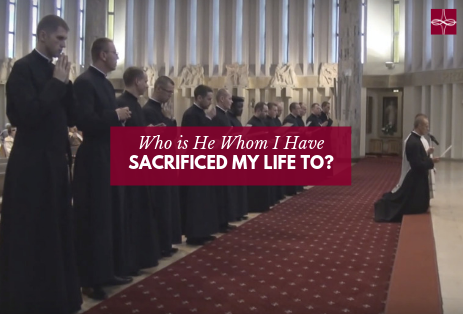
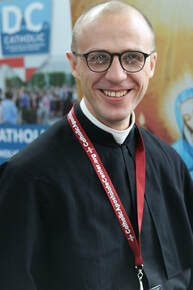
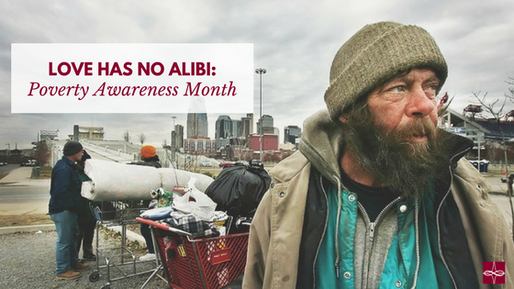

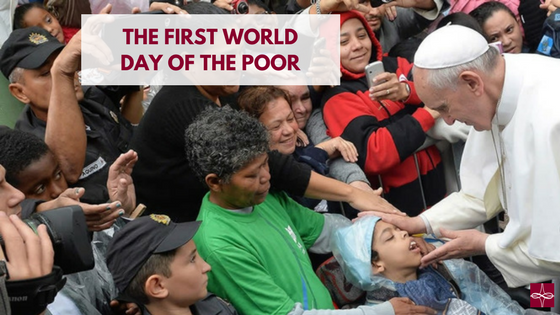

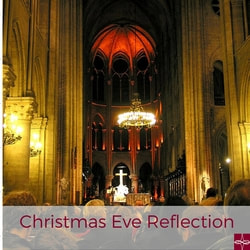
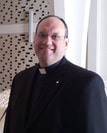
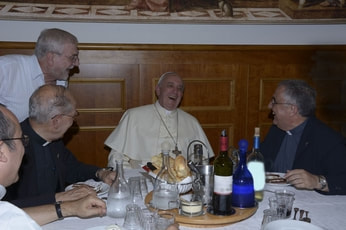

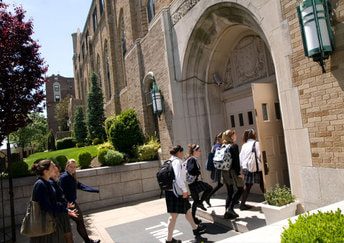
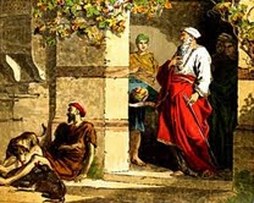

 RSS Feed
RSS Feed